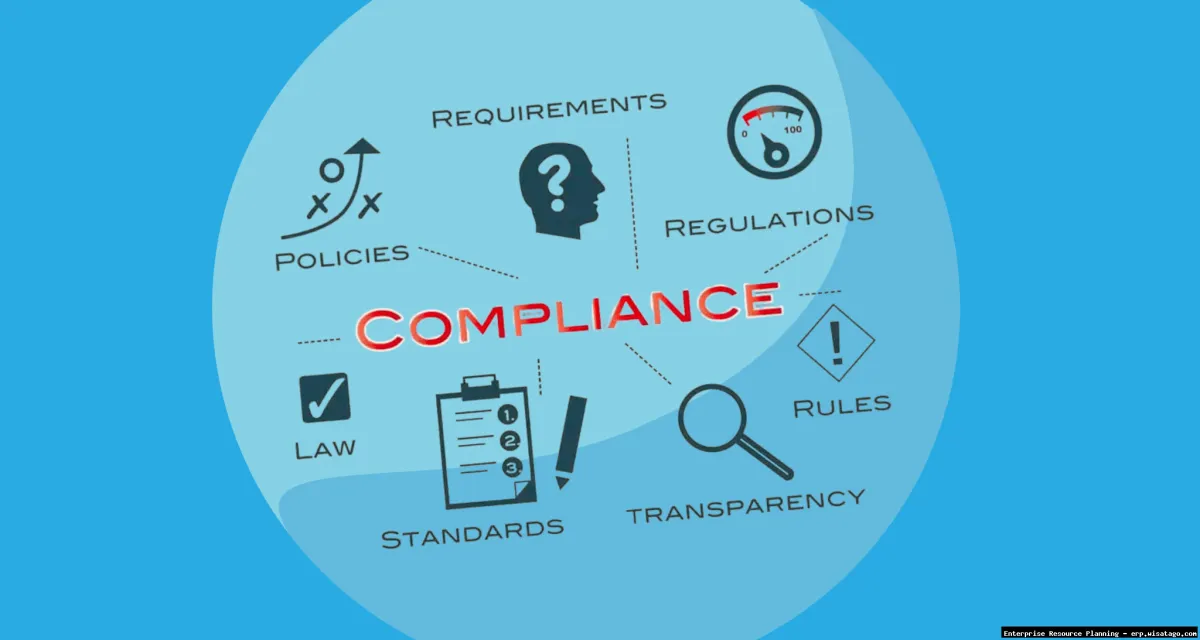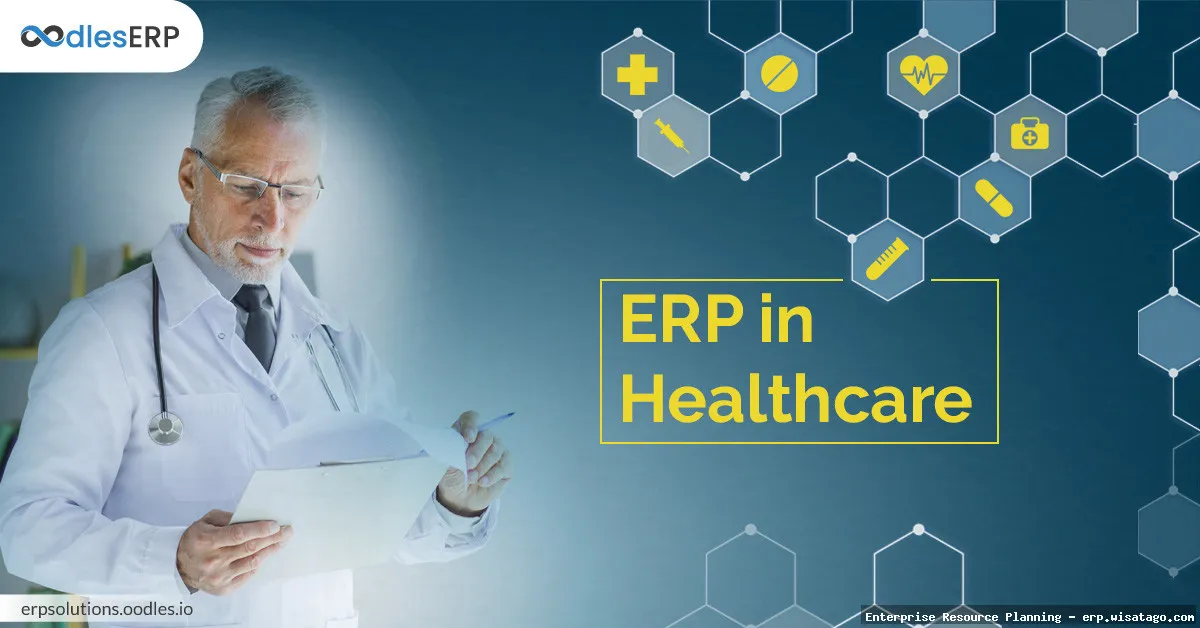Healthcare Industry-Specific ERP Compliance Features: Complete Guide, Features and Details
Implementing an Enterprise Resource Planning (ERP) system is a significant undertaking for any organization, but it’s especially crucial in the healthcare industry. We’re talking about managing sensitive patient data, adhering to stringent regulations, and ensuring smooth operational efficiency to deliver the best possible care. I’ve seen firsthand how a well-chosen and properly implemented ERP can transform a healthcare provider, streamlining everything from supply chain management to patient billing. But, and this is a big but, the system must be compliant with the industry’s unique requirements.
Choosing an ERP system that isn’t specifically designed for healthcare is like trying to fit a square peg in a round hole. You’ll end up with workarounds, manual processes, and a constant headache trying to maintain compliance. The costs associated with non-compliance – fines, reputational damage, and even legal ramifications – can be devastating. That’s why understanding the industry-specific compliance features of an ERP system is paramount for healthcare organizations. We need to look beyond the general features and delve into the functionalities that address the unique needs of the sector.

This guide will walk you through the essential healthcare industry-specific ERP compliance features. We’ll explore the key regulations you need to be aware of, the ERP functionalities that support compliance, and the critical considerations for selecting the right system. My goal is to provide you with a comprehensive understanding of these features so you can make an informed decision and implement an ERP system that not only streamlines your operations but also ensures you remain compliant and deliver exceptional patient care. I’ll share insights from my own experiences, highlighting common pitfalls and offering practical advice to help you navigate this complex landscape.
Understanding Healthcare Compliance and its Impact on ERP
The healthcare industry is heavily regulated, and for good reason. We’re dealing with sensitive patient information and critical services, so compliance is non-negotiable. Failing to meet regulatory requirements can lead to serious consequences, including hefty fines, legal battles, and irreparable damage to your organization’s reputation. An ERP system designed for healthcare needs to be built with these regulations in mind, providing the tools and functionalities to ensure compliance at every level.
Key Healthcare Regulations Affecting ERP Systems
Here are some of the most important regulations that directly impact the requirements of a healthcare ERP system:
- HIPAA (Health Insurance Portability and Accountability Act): This is arguably the most well-known regulation, focusing on the privacy and security of protected health information (PHI). ERP systems must have robust security measures to prevent unauthorized access, use, or disclosure of PHI.
- HITECH Act (Health Information Technology for Economic and Clinical Health Act): This act strengthens HIPAA by increasing penalties for violations and promoting the adoption of electronic health records (EHRs). ERP systems that integrate with EHRs must comply with HITECH‘s requirements.
- FDA Regulations (Food and Drug Administration): These regulations govern the manufacturing, distribution, and use of medical devices and pharmaceuticals. ERP systems used in these areas must track lot numbers, expiration dates, and other critical information to ensure product safety and compliance.
- Stark Law: This law prohibits physician self-referral, meaning physicians cannot refer patients to entities in which they have a financial interest. ERP systems can help track referrals and ensure compliance with Stark Law.
- Anti-Kickback Statute: This law prohibits offering or receiving anything of value in exchange for referrals of patients covered by federal healthcare programs. ERP systems can help monitor financial transactions and identify potential violations.
- State-Specific Regulations: In addition to federal regulations, many states have their own healthcare laws and regulations. ERP systems must be adaptable to meet these varying requirements.
The Role of ERP in Achieving Compliance
A healthcare-specific ERP system acts as a central repository for all your organization’s data, providing a single source of truth for compliance-related information. By automating processes, improving data accuracy, and providing robust reporting capabilities, an ERP system can significantly reduce the risk of non-compliance. It provides the framework for implementing and enforcing compliance policies and procedures across the organization.
Essential Healthcare ERP Compliance Features
Now, let’s dive into the specific features that are crucial for ensuring compliance in a healthcare ERP system. These features address the key regulatory requirements and help organizations manage their operations in a compliant and efficient manner.

Data Security and Access Control
Protecting patient data is paramount. A compliant ERP system must have robust data security measures, including:
- Role-Based Access Control (RBAC): This allows you to define specific roles and grant access permissions based on those roles. Only authorized personnel should have access to sensitive data. For example, a billing clerk should only have access to billing-related information, not patient medical records.
- Encryption: Data should be encrypted both in transit and at rest to prevent unauthorized access. This ensures that even if data is intercepted, it cannot be read.
- Audit Trails: The system should maintain a detailed audit trail of all data access and modifications. This allows you to track who accessed what data and when, which is essential for investigating potential breaches.
- Data Masking: This feature allows you to mask sensitive data, such as social security numbers, while still allowing authorized users to perform their duties.
HIPAA Compliance Features
Beyond general data security, an ERP system needs specific features to support HIPAA compliance:
- PHI Tracking: The system should be able to track and manage PHI throughout its lifecycle, from creation to disposal.
- Breach Notification Management: In the event of a data breach, the system should facilitate the notification process, including identifying affected individuals and generating required reports.
- Business Associate Agreements (BAAs): The system should help manage BAAs with third-party vendors who have access to PHI.
Inventory Management and Traceability
For healthcare providers and pharmaceutical companies, inventory management is critical for compliance with FDA regulations and other standards. The ERP system should provide:
- Lot Tracking: Track the movement of inventory by lot number, allowing you to quickly identify and recall affected products in case of a defect or safety issue.
- Expiration Date Management: Monitor expiration dates and prevent the use of expired products.
- Serialization: Track individual items with unique serial numbers, providing enhanced traceability and preventing counterfeiting.
- Recall Management: Streamline the recall process, from identifying affected products to notifying customers and regulatory agencies.
Billing and Revenue Cycle Management
Accurate and compliant billing is essential for financial stability and avoiding penalties. The ERP system should include:
- Coding Compliance: Ensure that billing codes are accurate and up-to-date, reducing the risk of errors and denials.
- Claim Scrubbing: Automatically identify and correct errors in claims before submission, improving claim acceptance rates.
- Denial Management: Track and manage denied claims, identifying the root causes of denials and implementing corrective actions.
- Contract Management: Manage contracts with payers, ensuring that you are being reimbursed correctly for your services.
Reporting and Analytics
A compliant ERP system should provide robust reporting and analytics capabilities to monitor key performance indicators (KPIs) and identify potential compliance issues. This includes:

- Compliance Dashboards: Provide a real-time view of compliance status, highlighting areas that require attention.
- Audit Reports: Generate detailed audit reports to demonstrate compliance to regulatory agencies.
- Ad-Hoc Reporting: Create custom reports to analyze data and identify trends.
Choosing the Right Healthcare ERP System
Selecting the right ERP system is a critical decision that can have a significant impact on your organization’s success. Here are some key considerations to keep in mind:. Many business owners find themselves needing to invest in better ways to manage their resources, ERP which helps streamline operations and improve efficiency
.
Assess Your Needs and Requirements
Before you start evaluating ERP systems, take the time to thoroughly assess your organization’s needs and requirements. This includes:
- Identifying your pain points: What are the biggest challenges you’re facing with your current systems and processes?
- Defining your business goals: What are you hoping to achieve with an ERP system?
- Mapping your processes: Document your key business processes to understand how they will be supported by the ERP system.
- Determining your compliance requirements: Identify all the regulations that apply to your organization.
Evaluate ERP Vendors
Once you have a clear understanding of your needs, you can start evaluating ERP vendors. Look for vendors that have a proven track record in the healthcare industry and offer systems with the compliance features you need. Consider these factors:
- Industry Expertise: Does the vendor have experience working with healthcare organizations similar to yours?
- Compliance Certifications: Does the system have certifications that demonstrate compliance with relevant regulations, such as HIPAA?
- Scalability: Can the system scale to meet your organization’s growing needs?
- Integration Capabilities: Can the system integrate with your existing systems, such as EHRs and practice management software?
- Customer Support: Does the vendor offer reliable customer support and training?
Implementation and Training
Implementing an ERP system is a complex process that requires careful planning and execution. Work with the vendor to develop a detailed implementation plan and ensure that your staff receives adequate training. A good implementation partner is worth their weight in gold. They can guide you through the process, minimize disruption, and ensure a smooth transition.
Ongoing Monitoring and Maintenance
Compliance is an ongoing process, so it’s important to continuously monitor your ERP system and ensure that it remains compliant with the latest regulations. Regularly review your security settings, update your software, and provide ongoing training to your staff.

Conclusion
Investing in a healthcare industry-specific ERP system is a critical step for organizations that want to streamline their operations, improve efficiency, and ensure compliance. By understanding the key regulations, evaluating ERP vendors carefully, and implementing the system effectively, you can reap the many benefits of an ERP system while minimizing the risk of non-compliance. Remember to prioritize data security, HIPAA compliance, inventory management, and accurate billing. A well-chosen and properly implemented ERP system can be a game-changer for your healthcare organization, helping you deliver better patient care and achieve your business goals.
Conclusion
In conclusion, navigating the complex landscape of healthcare regulations demands more than just a standard Enterprise Resource Planning system. Implementing an ERP solution with industry-specific compliance features is not simply a best practice, but a critical necessity for healthcare organizations. These features, encompassing functionalities for HIPAA compliance, patient data security, accurate billing and coding, and efficient supply chain management, ensure operational efficiency while simultaneously safeguarding patient information and mitigating the risks associated with regulatory violations. Ultimately, the right ERP system acts as a powerful tool, enabling healthcare providers to focus on their core mission: delivering exceptional patient care.
By understanding the nuances of healthcare compliance and investing in an ERP solution tailored to meet these specific needs, organizations can achieve a significant competitive advantage. We encourage healthcare leaders to thoroughly evaluate their current systems and explore the benefits of integrating industry-specific compliance features. A proactive approach to compliance, facilitated by the right ERP, not only avoids costly penalties and reputational damage but also fosters a culture of trust and accountability. To learn more about how a healthcare-specific ERP can benefit your organization, we invite you to contact us for a consultation.
Frequently Asked Questions (FAQ) about Healthcare Industry-Specific ERP Compliance Features
What healthcare industry-specific compliance regulations can an ERP system help my organization meet, such as HIPAA and FDA requirements?
An ERP (Enterprise Resource Planning) system tailored for the healthcare industry can significantly streamline compliance with regulations like HIPAA (Health Insurance Portability and Accountability Act) and FDA (Food and Drug Administration) mandates. For HIPAA, the ERP can enforce access controls to protected health information (PHI), maintain audit trails of data access and modifications, and support secure data transmission. This helps meet requirements for data privacy and security. For FDA compliance, particularly related to pharmaceutical manufacturing or medical device production, the ERP can manage lot tracking and tracing, track equipment maintenance and calibration, and ensure adherence to good manufacturing practices (GMP) through built-in workflows and documentation controls. These features ensure product safety and regulatory reporting accuracy, essential for avoiding fines and maintaining operational integrity.
How does a healthcare ERP system’s data security and audit trail functionality ensure patient data privacy and compliance with data breach notification laws?
Healthcare ERP systems prioritize data security and audit trails to protect patient data privacy and comply with data breach notification laws. Robust access control features restrict access to sensitive patient information based on user roles and permissions, minimizing the risk of unauthorized access. Comprehensive audit trails track all data modifications, user activities, and system events, providing a detailed record for investigations in case of a potential breach. Encryption, both in transit and at rest, safeguards data from interception or unauthorized access. These features collectively enable healthcare organizations to quickly identify breaches, assess the extent of the compromise, and comply with mandatory data breach notification requirements, such as those stipulated by HIPAA. By proactively managing data security and maintaining detailed audit logs, ERP systems significantly mitigate the risk of data breaches and ensure accountability.
What specific ERP features support compliance with coding and billing regulations in healthcare, such as ICD-10 and CPT codes, and how does it prevent claim denials?
Healthcare ERP systems offer specific features to support compliance with coding and billing regulations, including ICD-10 (International Classification of Diseases, Tenth Revision) and CPT (Current Procedural Terminology) codes. These features include built-in code validation to ensure accurate and compliant coding practices. The system often integrates with coding databases to provide real-time updates and reduce errors. Automated claims scrubbing tools identify potential billing errors before submission, such as missing information or incorrect coding combinations. By automating these processes, the ERP system minimizes human error, ensures adherence to coding guidelines, and prevents claim denials from payers. Integration with payer portals allows for direct submission and tracking of claims, streamlining the billing cycle and improving revenue cycle management. Compliance reporting ensures all billing practices adhere to the latest regulations.